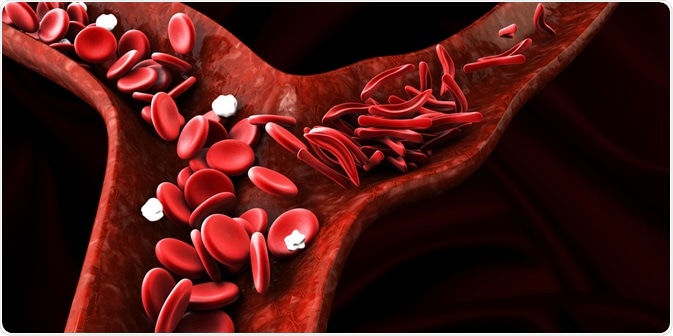Sickle cell disease carriers, also sometimes referred to as people with sickle cell trait, are individuals that carry a single gene mutation for sickle cell disease. Carriers do not tend to have any symptoms and usually only know that they have the trait if they are tested for the disease.
 A blood vessel with normal and deformed crescent-shaped cells characteristic of sickle cell anemia. Image Credit: Victor Josan / Shutterstock.com
A blood vessel with normal and deformed crescent-shaped cells characteristic of sickle cell anemia. Image Credit: Victor Josan / Shutterstock.com
Sickle cell disease vs. sickle cell trait
The main difference between sickle cell disease and trait is that people with the disease have two gene mutations, whereas people with the trait have one gene mutation. The mutated gene affects the shape of the hemoglobin cells in the blood so that they become sickle-shaped rather than flat discs.
With one gene mutation (sickle cell trait) only a small proportion of the hemoglobin cells are affected and symptoms only become noticeable in extreme situations, such as extreme heat, dehydration, high altitudes and significant stress. With two gene mutations (sickle cell disease), there is a greater proportion of affected hemoglobin cells and symptoms are much more prominent.
Individuals with sickle cell trait do not usually need any treatment and can live an otherwise normal life, although some extra care may be needed when planning to have a family.
At-risk populations
Although anyone can be a carrier of sickle cell disease, the trait is more common in some populations. People at greatest risk are those with origins from:
- Africa
- Caribbean
- Middle East
- India
- Easter Mediterranean
In the United Kingdom, approximately 240,000 people carry a defective sickle gene and 1 in 2,400 babies have sickle cell disease.
Autosomal recessive inheritance pattern
Sickle cell disease is inherited in an autosomal recessive pattern, which means that males and females are affected equally and both parents must carry a defective gene for a child to be diagnosed with the disease.
If both the mother and the father are genetic carriers, there is a:
- 25% chance the child will have sickle cell disease
- 50% chance the child will be a carrier, with a sickle cell trait
- 25% chance the child will not carry a defective gene
If one parent is a carrier, there is a 25% chance the child will possess the trait but will otherwise be unaffected.
Sickle cell anemia - causes, symptoms, diagnosis, treatment & pathology
Family planning
Sickle cell disease carriers are a distinctive population group as they have the potential to pass the trait on to their children. If their child inherits two genes, one from each parent, they are likely to be affected by the serious form of the disease.
For this reason, couples expecting a child will often want to know if they possess the trait, to understand if their child might be affected by sickle cell disease. There are currently screening tests available for pregnant women and newborn babies that can determine the presence of defective genes or hemoglobin cells from a blood sample.
If a pregnant mother is found to be a genetic carrier, the father is usually tested as well to determine the baby’s risk of being affected by the disease. When a baby is at risk, there is a prenatal test that is able to determine the genetic status of the baby from two to three months after conception.
References
Further Reading
Last Updated: Jan 27, 2021